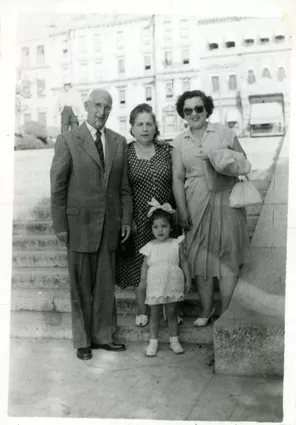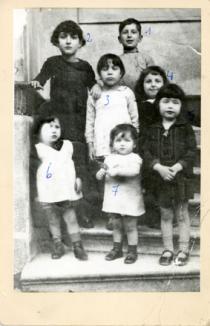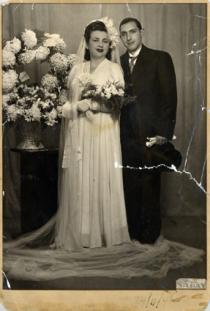In this photograph, you can see my father, mother, myself and my daughter on a street in Bursa.
My father Jak Sages was born in Bursa (1881). He came and went to Istanbul often. He wasn't very educated but he was an esteemed merchant. My father's good looks were legendary. He had good relationships with the women in his factory. He was a tough father. He had an authoritarian attitude with his wife and son, when it came to me, he melted down. He was cool toward religious matters, some of the arguments he had with my mother were even about how to apply our religious traditions. When the usher knocked on our door on Saturday mornings and yelled "Monsieur Sages al kal" (Mr. Sages to the synagogue), I would respond "En la fabrika de Paskal" (at the factory of Paskal). During the hours when the usher came to the door and enouraged the community to go to the synagogue, my father would be at the factory to prevent the silk cocoons from tangling with each other. Silk commerce was his life. There was a concept of spinning wheel for silk. He was an expert in this subject. He knew how to produce more silk from less cocoons. (Even today Bursa is at the heart of textile commerce). He always protected his good name in the commercial circles.
In the last years of his life, he moved to Istanbul with my mother at the insistance of my older brother. He died in Istanbul in 1975.
My mother Mari Sages' last name before she was married was Abravanel. Mari Sages was an educated woman. She was a teacher. When she came to Bursa as a bride, the siblings of her husband were not married yet. They started living all together. My mother's French was advanced. Her religious beliefs were very strong. She used to light the Sabbath candles (On Fridays, before it becomes the Sabbath, the two lights that the woman of the house light along with a prayer. This procedure was done by rolling cotton inside oil in the old times, now candles are lit), she tried to observe the rules of kashrut. The hardest days of our home were the days close to Passover. My mother would clean the whole house from top to bottom and did not want us to enter the place she cleaned until Passover. This was called "Ya entro pesah en esta kamareta" (Passover entered this room). When it was the turn for the diningroom, my father would start getting upset. Because he did not like eating in the entrance hall that we called kortijo at all, he used to topple the table over. My mother, on the other hand, continued Passover preparations with a lot of calm. My mother who liked to get dolled up never refrained from putting on her lipstick before my father came home from work, and would put on her necklace and earrings a lot of the times too.
When I became pregnant with Lucy, it meant the world to my husband. But I had such a difficult pregnancy, such a difficult birth, and a difficult postpartum period that the guy did not want a child again. When Lucy was born she was the sweetest baby in the world, or it seemed that way to me, but I would faint all of a sudden. My mother took me to Bursa during this period, cured me and sent me back to Istanbul again.



































